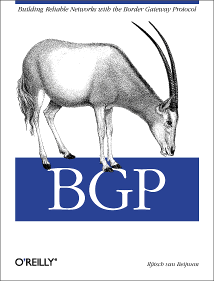
|

|

|
|
Home ·
BGP Expert Test ·
What is BGP? ·
BGP Vendors ·
Links ·
Archives ·
Books ·
My New BGP Book | ||
 (advertisement)
(advertisement)
| ||
|
BST: BGP Scalable Transport (posted 2003-02-19)
A company called Packet Design has developed BGP Scalable Transport (BST), a transport protocol for BGP that is intended to replace TCP as the carrier potocol for BGP routing information. Packet Design isn't afraid to make bold claims; their press release about the protocol heads "Packet Design solves security, reliability problems of major internet routing protocol, BGP." But BST really only addresses the problem that each BGP router in an organization is required to talk to every other BGP router. This gets out of hand very fast in larger networks. But two solutions have been around for years: route reflectors and confederations. When a BGP router is configured to be a route reflector, it checks for routing loops so it can safely "reflect" routing information from one router to another, eliminating the need to have every two routers communicate directly. Confederations break up large Autonomous Systems (ASes) into smaller ones and accomplish the same thing in a different way. Packet Design solves the problem by flooding BGP updates throughout the internal network, much the same way protocols such as OSPF and IS-IS do. Packet Design claims that this will help with convergence speed and reliability and even security. Their reasoning is that using IPsec on lots of individual TCP sessions uses too much CPU so protecting BGP over TCP with IPsec is unfeasible. But even on a Pentium II @ 450 MHz with SHA-1 authentication you get 17 Mbps (see performance tests). Exchange of a full routing table takes about 8 MB and 1 minute = around 1 Mbps so with less than 17 peers receiving a full table the crypto can keep up without trouble. And that's even assuming internal BGP sessions need this level of protection. External BGP sessions are a more natural candidate for this but eBGP doesn't have the same scalability problem as iBGP. It also assumes the security problems BGP has can be fixed at the TCP level. However, the most important BGP vulnerability is that there is no scalable and reliable way to check whether the origin of a BGP route is allowed to send out the route in question to begin with and whether any information was changed en route (by on otherwise legitimate intermediate router). These issues are addressed by soBGP and S-BGP.
|
